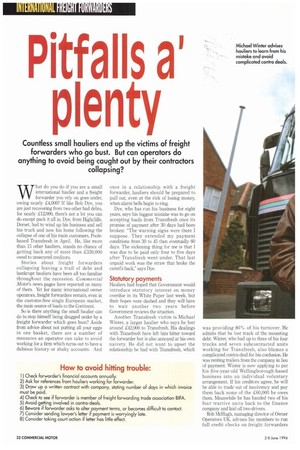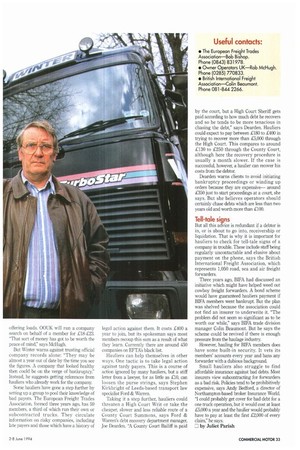Pitfalls a' plenty
Page 34

Page 35

If you've noticed an error in this article please click here to report it so we can fix it.
Countless small hauliers end up the victims of freight forwarders who go bust. But can operators do anything to avoid being caught out by their contractors collapsing?
What do you do if you are a small international haulier and a freight forwarder you rely on goes under, owing nearly .14,000? If like Bob Dye, you are just recovering from two other bad debts, for nearly £12,000, there's not a lot you can do except pack it all in. Dye, from Highcliffe. Dorset, had to wind up his business and sell his truck and now his home following the collapse of one of his main customers, Poolebased Transfresh in April. He, like more than 15 other hauliers, stands no chance of getting back any of more than .030,000 owed to unsecured creditors.
Stories about freight forwarders collapsing leaving a trail of debt and bankrupt hauliers have been all too familiar throughout the recession. Commercial Motor's news pages have reported on many of them. Yet for many international owner operators, freight forwarders remain, even in the customs-free single European market, the main source of loads to the Continent.
So is there anything the small haulier can do to stop himself being dragged under by a freight forwarder which goes bust? Aside from advice about not putting all your eggs in one basket, there are a number of measures an operator can take to avoid working for a firm which turns out to have a dubious history or shaky accounts. And once in a relationship with a freight forwarder, hauliers should be prepared to pull out, even at the risk of losing money, when alarm bells begin to ring.
Dye, who has run his business for eight years, says his biggest mistake was to go on accepting loads from Transfresh once its promise of payment after 30 days had been broken: "The warning signs were there I suppose. They extended my payment conditions from 30 to 45 then eventually 60 days. The sickening thing for me is that I was due to be paid only four to five days after Transfresh went under. That last unpaid work was the straw that broke the camel's back," says Dye.
Statutory payments
Hauliers had hoped that Government would introduce statutory interest on money overdue in its White Paper last week, but their hopes were dashed and they will have to wait another two years before Government reviews the situation.
Another Transfresh victim is Michael Winter, a larger haulier who says he lost around £42,000 to Transfresh. His dealings with Transfresh have left him bitter toward the forwarder but is also annoyed at his own naivety. He did not want to upset the relationship he had with Transfresh, which was providing 80% of his turnover. He admits that he lost track of the mounting debt Winter, who had up to three of his four trucks and seven subcontracted units working for Transfresh, also blames a complicated contra-deal for his confusion. He was renting trailers from the company in lieu of payment. Winter is now applying to put his five-year-old Wellingborough-based business into an individual voluntary arrangement. If his creditors agree, he will be able to trade out of insolvency and pay them back some of the 160,000 lie owes them. Meanwhile he has handed two of his four tractive units back to the finance company and laid off two drivers.
Rob McHugh, managing director of Owner Operators UK, advises his members to run full credit checks on freight forwarders offering loads. 00UK will run a company search on behalf of a member for £18-£23. "That sort of money has got to be worth the peace of mind," says McHugh.
But Winter warns against trusting official company records alone: "They may be almost a year out of date by the time you see the figures. A company that looked healthy then could be on the verge of bankruptcy." Instead, he suggests getting references from hauliers who already work for the company.
Some hauliers have gone a step further by setting up a group to pool their knowledge of bad payers. The European Freight Trades Association, formed three years ago, has 59 members, a third of which run their own or subcontracted trucks. They circulate information on risky companies, including late payers and those which have a history of legal action against them. It costs £400 a year to join, but its spokesman says most members recoup this sum as a result of what they learn. Currently there are around 450 companies on EFTA's black list.
Hauliers can help themselves in other ways. One tactic is to take legal action against tardy payers. This is a course of action ignored by many hauliers, but a stiff letter from a lawyer, for as little as £10, can loosen the purse strings, says Stephen Kirkbright of Leeds-based transport law specialist Ford & Warren.
Taking it a step further, hauliers could threaten a High Court Writ or take the cheaper, slower and less reliable route of a County Court Summons, says Ford & Warren's debt recovery department manager, Joe Dearden. "A County Court Bailiff is paid by the court, but a High Court Sheriff gets paid according to how much debt he recovers and so he tends to be more tenacious in chasing the debt," says Dearden. Hauliers could expect to pay between 1180 to £400 in trying to recover more than £5,000 through the High Court. This compares to around £130 to £250 through the County Court, although here the recovery procedure is usually a month slower. If the case is successful, however, a haulier can recover his costs from the debtor_ Dearden warns clients to avoid initiating bankruptcy proceedings or winding up orders because they are expensive— around £350 just to start proceedings at a court, she says. But she believes operators should certainly chase debts which are less than two years old and worth more than £100.
Tell-tale signs
But all this a&ice is redundant if a debtor is in, or is about to go into, receivership or liquidation. That is why it is important for hauliers to check for tell-tale signs of a company in trouble. These include staff being regularly uncontactable and elusive about payment on the phone, says the British International Freight Association, which represents 1,050 road, sea and air freight forwarders.
Three years ago, BIFA had discussed an initiative which might have helped weed out cowboy freight forwarders. A bond scheme would have guaranteed hauliers payment if BIFA members went bankrupt. But the plan was shelved because the association could not find an insurer to underwrite it. "The problem did not seem so significant as to be worth our while," says BIFA trade division manager Colin Beaumont. But he says the scheme could be revived if there is enough pressure from the haulage industry.
However, hauling for BIFA members does have some built-in security. It vets its members' accounts every year and bans any forwarder with a dubious background.
Small hauliers also struggle to find affordable insurance against bad debts. Most insurers view subcontracting for forwarders as a bad risk. Policies tend to be prohibitively expensive, says Andy Bedford, a director of Northampton-based broker Insurance World. "I could probably get cover for bad debt for a one truck operation, but it would cost at least £5,000 a year and the haulier would probably have to pay at least the first £2,000 of every claim," he says.
by Juliet Parish
















































































